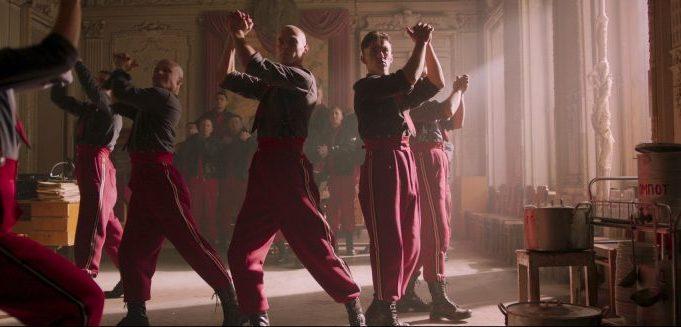‘Captain Volkonogov Escaped’: Film Review | Venice 2021
Russian co-directors Natasha Merkulova and Aleksey Chupov ('Intimate Parts') explore the spiritual journey of a secret policeman, played by Yuriy Borisov, who breaks ranks in Soviet-era Leningrad.
Propulsive and tightly constructed, Captain Volkonogov Escaped is a Russian period-set drama about a Soviet secret policeman who suddenly sprouts a soul, played by the always watchable, recently much in-demand Yuriy Borisov (Petrov’s Flu). Flecks of jet-black humor add a wicked sparkle to an essentially tragic narrative. Aficionados of Russian literature will note the film’s thematic similarity to works by Fyodor Dostoevsky, with the emphasis on redemption, as well as the absurdism of Nikolai Gogol and — perhaps more aptly given the 1930s setting — the proto-magical realism of Mikhail Bulgakov.
In the end, however, the film’s married writing and directing collaborators Natasha Merkulova and Aleksey Chupov (Intimate Parts, The Man Who Surprised Everyone) have fashioned a quintessentially cinematic take on not-so distant history. While Volkonogov superficially looks back toward the last century, it could also easily be read as a more timeless comment on how malignant, repressive states — like, say, Putin’s Russia today — distort and wither the souls of a nation’s complicit apparatchiks and footsoldiers.
Russian co-directors Natasha Merkulova and Aleksey Chupov ('Intimate Parts') explore the spiritual journey of a secret policeman, played by Yuriy Borisov, who breaks ranks in Soviet-era Leningrad.
Propulsive and tightly constructed, Captain Volkonogov Escaped is a Russian period-set drama about a Soviet secret policeman who suddenly sprouts a soul, played by the always watchable, recently much in-demand Yuriy Borisov (Petrov’s Flu). Flecks of jet-black humor add a wicked sparkle to an essentially tragic narrative. Aficionados of Russian literature will note the film’s thematic similarity to works by Fyodor Dostoevsky, with the emphasis on redemption, as well as the absurdism of Nikolai Gogol and — perhaps more aptly given the 1930s setting — the proto-magical realism of Mikhail Bulgakov.
In the end, however, the film’s married writing and directing collaborators Natasha Merkulova and Aleksey Chupov (Intimate Parts, The Man Who Surprised Everyone) have fashioned a quintessentially cinematic take on not-so distant history. While Volkonogov superficially looks back toward the last century, it could also easily be read as a more timeless comment on how malignant, repressive states — like, say, Putin’s Russia today — distort and wither the souls of a nation’s complicit apparatchiks and footsoldiers.
‘Captain Volkonogov Escaped’: Film Review | Venice 2021
Russian co-directors Natasha Merkulova and Aleksey Chupov ('Intimate Parts') explore the spiritual journey of a secret policeman, played by Yuriy Borisov, who breaks ranks in Soviet-era Leningrad.
Propulsive and tightly constructed, Captain Volkonogov Escaped is a Russian period-set drama about a Soviet secret policeman who suddenly sprouts a soul, played by the always watchable, recently much in-demand Yuriy Borisov (Petrov’s Flu). Flecks of jet-black humor add a wicked sparkle to an essentially tragic narrative. Aficionados of Russian literature will note the film’s thematic similarity to works by Fyodor Dostoevsky, with the emphasis on redemption, as well as the absurdism of Nikolai Gogol and — perhaps more aptly given the 1930s setting — the proto-magical realism of Mikhail Bulgakov.
In the end, however, the film’s married writing and directing collaborators Natasha Merkulova and Aleksey Chupov (Intimate Parts, The Man Who Surprised Everyone) have fashioned a quintessentially cinematic take on not-so distant history. While Volkonogov superficially looks back toward the last century, it could also easily be read as a more timeless comment on how malignant, repressive states — like, say, Putin’s Russia today — distort and wither the souls of a nation’s complicit apparatchiks and footsoldiers.
0 Comments
0 Shares
0 Reviews




